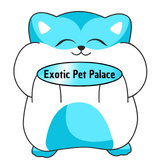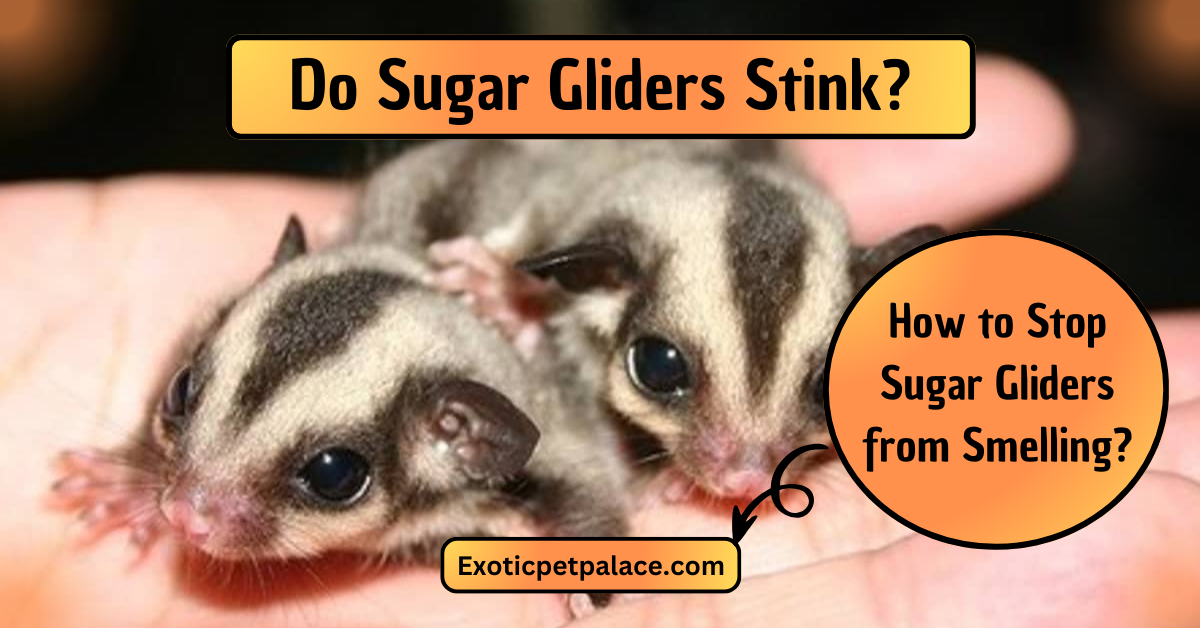Sugar gliders are lovely marsupials with stunning eyes who like floating through the night.
However, potential owners frequently ask, “Do sugar gliders stink?” The answer, like many things in life, is a little deeper than a straightforward yes or no.
This article delves into the world of sugar glider odors, exploring why they might smell, how to minimize unpleasantness, and ways to eliminate unwanted scents.
Stay with me till the end if you are a glider owner.
Also Read:
👉How to bond with a sugar glider?
👉How do I know if my sugar glider is dying?
Let’s start.
3 Reasons Why Does My Sugar Glider Smell?
Do Sugar Gliders Stink? The short answer is, they shouldn’t.
However, some may have an unpleasant odor as a result of things like as poor food, dirty cages, and scent marking.
Let’s dive into why they smell.
Several factors can contribute to a sugar glider’s odor:
1- Improper Diet:
Sugar gliders are sensitive to food, and excessive intake of proteins, such as meats, insects, and eggs, can make them smell like ferrets.
Acidic fruits like bananas can cause diarrhea and foul odors. And an improper diet lacking essential nutrients or overloaded with sugary treats can lead to digestive issues.
These issues can manifest as a stronger odor in their urine and feces.
2- Unhygienic Cage:
Just like any pet, a dirty cage creates an ammonia build-up from uneaten food, urine, and feces. This build-up translates into a noticeable ammonia odor.
Train sugar gliders to properly dispose of their urine and feces, as they may excrete in the cage, making cleaning and eliminating the odor more challenging.
This is especially important for baby gliders with developing digestive systems.
3- Scent Marking:
Male sugar gliders have more scent glands, leading to a musky smell, especially during breeding season.
Their over-marking may also contribute to their odor. Regular cleaning of their cages can eliminate their scent, causing them to feel they need to maintain their territory.
How to Stop Sugar Gliders from Smelling?
The good news is that, with appropriate care, sugar gliders usually have a mild, musky odor that most people tolerate.
Here’s how to keep your glider smelling fresh:
1- Provide them the proper diet
Sugar gliders were originally wild animals that ate tree pulp, nectar, insects, fruits, and pollen.
Sugar gliders grown in captivity may be unable to replicate this diet, but it is feasible.
The question of what sugar gliders should consume is debatable, and veterinarians should advise on nutrition.
A sugar glider’s diet should consist of 50-75% pelletized food, 25% fresh fruit or vegetables, and 25% protein.
A calcium-phosphorus ratio of 1 to 2:1 is advised. Feed 15-20% of your body weight, and make sure you have access to clean, uncontaminated water every day.
BML is a nutritionally complete diet plan designed for exotic gliders. It contains eggs, honey, apple juice, vitamin supplements, baby food, baby cereal, greens, and pellets.
Read the article, to learn completely about “BML Sugar Glider Diet”.
👉BML Sugar Glider Diet (A Deep Dive into Sugar Glider Nutrition)
2- Clean the cage properly
A dirty cage can cause unpleasant odors, respiratory issues, and even bacterial diseases for your pet.
Therefore, cleaning the cage must be your top priority.
Here are three main stages of cleaning the glider’s cage.
- Daily Cleaning:
Daily upkeep is essential for keeping sugar gliders’ cages clean.
This includes cleaning feeding dishes, removing food residue, and refilling water with new water.
Clean dishes, trays, and toys with hot water and soap, then sterilize them every three months.
- Lining the cage
Line the cages with safe materials such as fleece or pine pellets, and replace them every two to three days.
- Deep cleaning:
Deep cleaning involves a thorough cleaning once every two weeks using vinegar and hot water.
Avoid using chemicals such as Clorox or bleach, as they might be dangerous. Wash fleece pouches and other cloth-like items in a washing machine to avoid over-marking.
Keeping these objects clean helps to avoid over-marking difficulties.
For complete details about the Cleaning of Cage, Read the article.
👉How To Clean Sugar Glider Cage?
3- Neutering Males
The strong smell of males, particularly unneutered ones, can be significantly reduced by neutering them.
4-Stress Management:
Provide a spacious cage with plenty of climbing opportunities and hiding places. Maintain a consistent sleep schedule and handle your glider gently to minimize stress.
How to Eliminate Sugar Glider Odors?
If you’re dealing with persistent unpleasant odors, here are some additional tips:
- Air Circulation: Ensure proper ventilation in the room where your glider’s cage is located. Stagnant air can trap odors.
- Bedding Choice: Certain types of bedding, like aspen chips, can absorb and control odors better than others.
- Air Purifiers: Consider using an air purifier in the room to help remove airborne odors. Choose one specifically designed for pet odors.
FAQs
A: Not really. The natural musky odor of sugar gliders is bearable. However, if they are fed a substandard diet and the males are not neutered, they may smell like ferrets or worse.
A: Yes, sugar gliders can be litter taught to some extent. They might not use the litter box exclusively, but it can aid with cage cleaning and odor management.
A: Sugar gliders are naturally clean creatures who often brush themselves. Avoid washing your glider with water, as it might alter their natural oils and exacerbate the unpleasant smell.
A: Briefly, sugar gliders aren’t inherently smelly, but can be messy. Proper care (diet, cage cleaning, stress reduction) minimizes odor. They have a mild musky scent, but strong or ammonia-like smells indicate a problem.
To keep sugar gliders fresh: feed them right, clean their cage often, neuter males, manage stress, and use odor-absorbing tricks like bedding and air purifiers. Skip the water baths!
Conclusion
By understanding the factors contributing to sugar glider odor and implementing the proper care practices outlined above, you can keep your furry friend smelling fresh and happy.
Remember, a healthy diet, good cage hygiene, stress management, and proactive cleaning are key.
If you have any concerns about your sugar glider’s odor, always consult a veterinarian.
With a little effort, you can ensure your sugar glider remains a delightful addition to your home, both visually and olfactory.
Bonus Tip: Consider using sugar glider-safe odor neutralizers specifically designed for small animals. These products can be sprinkled on bedding or placed in the cage to help control mild lingering odors.
Remember: A happy and healthy sugar glider is a fresh-smelling sugar glider!❤

